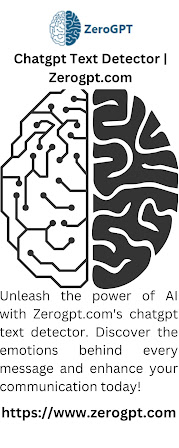Unleash the power of AI with Zerogpt.com's chatgpt text detector. Discover the emotions behind every message and enhance your communication today!
The emergence of AI produced text check tools is a notable event in an era when artificial intelligence pervades many areas of life. These technologies enable one to tell if a piece of material was created by a person or produced by an artificial intelligence model. The demand for AI-produced text checker systems is becoming more vital as artificial intelligence technology develops. The need for these tools, their features, and their effects on material authenticity are discussed in this paper. The Rise of AI Writing Tools The spread of artificial intelligence writing tools has transformed content generation by allowing quick text generation throughout several fields. But, especially in the distinction between human-generated and AI-generated material, this ease brings difficulties. The emergence of AI generated text check software solves this issue by providing a way to confirm the authorship and originality of content. The need for efficient verification systems i...

Comments
Post a Comment